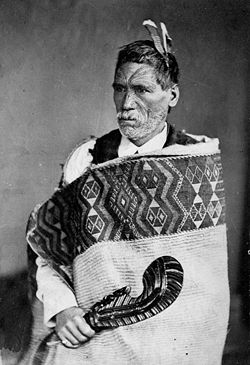
Rewi Maniapoto
Encyclopedia

Kinship
Rewi or Manga as he was known to his kin and hapuu was the child of Paraheke (Te Kore) and Kaawhia Te Ngohi (Te Ngohi Kaawhia) His mother was from Raukawa with connection to Kaputuhi. His father was a renowned fighting chief of Ngaati Paretekawa fame and was a signatory to the Tiriti O Waitangi, one of five chiefs from Maniapoto who signed.Invasion
Maniapoto was decisively beaten in every battle by General Cameron. He made a stand at Orakau in 1864.Rewi and the Kingitanga (Maori King Movement) rebels were surrounded by the government forces, with limited supplies of food and water. The government forces built a sap (trench) up to within 20m of the Pa and threw in hand grenades.An officer, Gilbert Mair who was a fluent Maori speaker, invited them to surrender or at least let out the woman and children. The Kingities refused, saying they would fight on forever, but at 3:30pm the same day a gun was bought to the head of the sap and shelled the pa (earth fort) at point blank range. At this the defenders panicked and leaving 50 toa (warrior) in the pa the rest made a sudden break through the government lines and into adjacent swamps. All 50 in the pa were killed or taken prisoner. 160 Kingitanga rebels died. Half of the escapees were wounded. 17 of the government forces died and 52 were wounded.Maniapoto stayed in the King Country south of the Punui river with the surviving rebels. He constructed 2 more Pa but the government forces did not follow him into the hills. Maniapoto played host to the rebel Waikato iwi (tribe) but relationships soured when the king tried to exert his mana (authority) over Maniapoto's land. This, together with Maniapoto's refusal to stand and fight at Rangiriri left a bitter note between the two rebel groups. Rewi became concerned at the outbreaks of drunkenness among his people and the murdering of isolated Pakeha (Europeans) travelling in the area. Eventually he agreed to sell land to the government for the main trunk railway line on the understanding that his men would be paid to cut the bush for the surveyors and no alcohol was to be sold in the King Country. Maniapoto was returned his hapu's (sub tribe) land at Kihikihi and given a house and a government pension. He became a great friend of Governor Grey and wished to be buried with him.
External links
from the Dictionary of New Zealand BiographyDictionary of New Zealand Biography
The Dictionary of New Zealand Biography contains biographies for over 3,000 New Zealanders. It is available in both English and Maori. All volumes of the Dictionary of New Zealand Biography are available online....
- Biography in 1966 An Encyclopaedia of New Zealand
- Bohan,Edmund.Climates of War.Hazard Press. 2005

